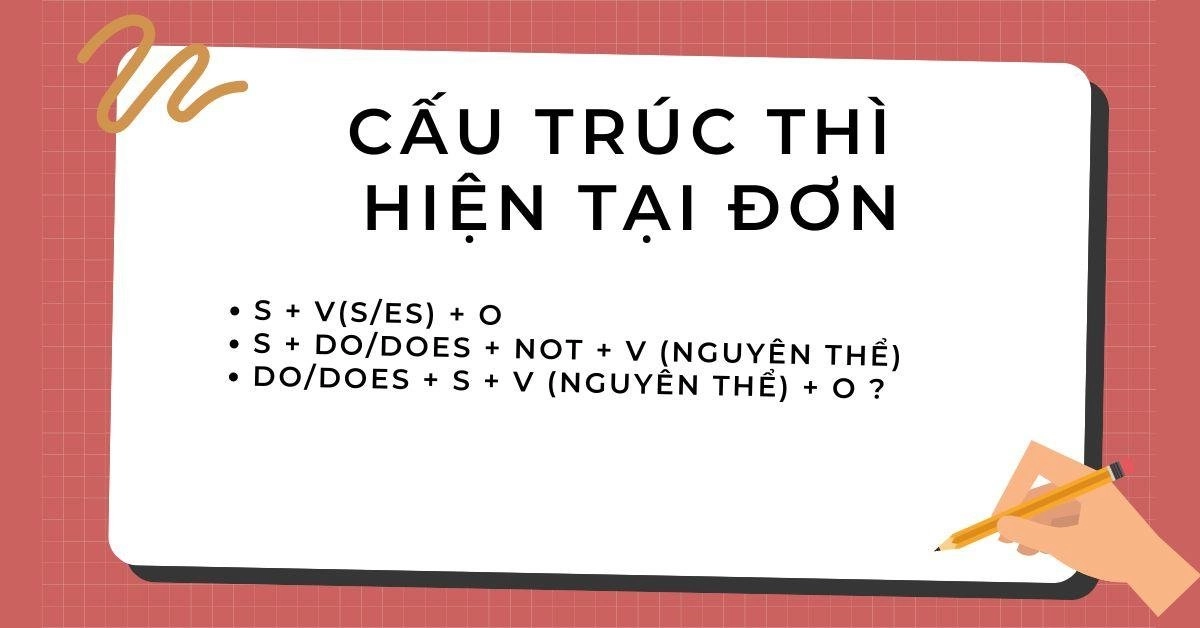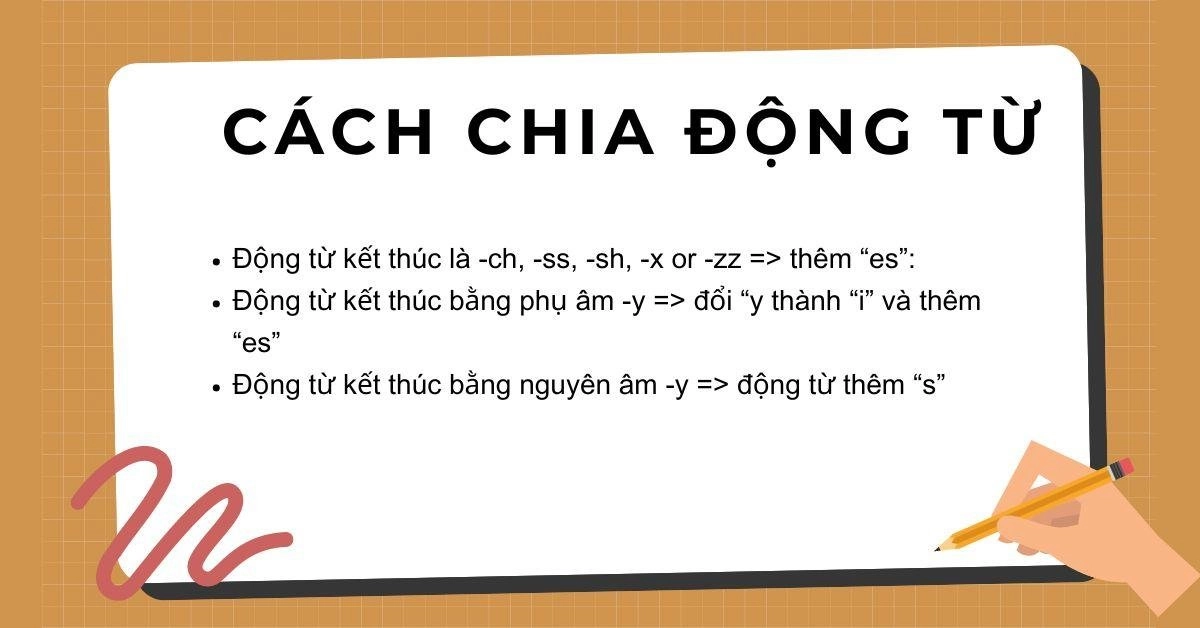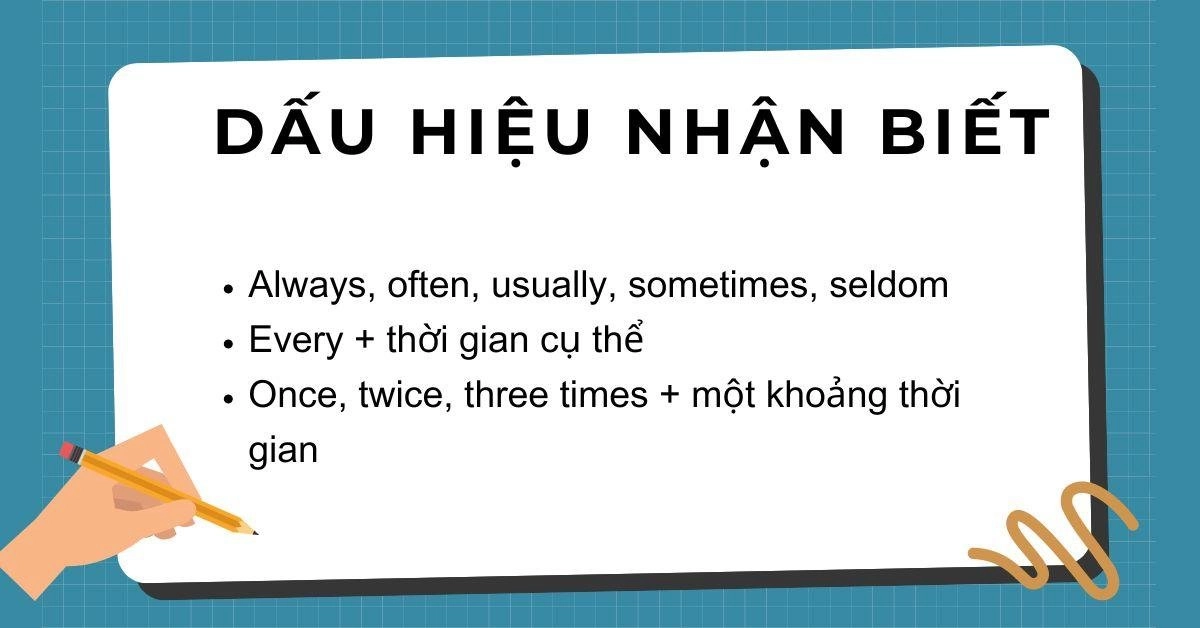Bài tập thì hiện tại đơn lớp 7 từ cơ bản đến nâng cao [Có đáp án]
Key takeaways
Thì hiện tại đơn được dùng để chỉ chân lý hoặc các sự kiện, hành động diễn ra thường xuyên.
Cấu trúc thì hiện tại đơn với động từ to be và động từ thường.
Cách sử dụng thì hiện tại đơn: dùng để diễn tả sự thật hiển nhiên, thói quen, đưa ra chỉ dẫn, các sự kiện nằm trong kế hoạch.
Trong chương trình tiếng Anh lớp 7, học sinh sẽ được làm quen và thực hành bài tập liên quan đến các thì khác nhau trong tiếng Anh. Trong đó, thì hiện tại đơn là một phần ngữ pháp trọng tâm mà học sinh cần nắm vững. Để giúp học sinh củng cố kiến thức và làm bài thành thạo, bài viết dưới đây sẽ tổng hợp kiến thức và các bài tập thì hiện tại đơn lớp 7.
Tổng quan lý thuyết về thì hiện tại đơn lớp 7
Khái niệm
Thì hiện tại đơn được dùng để chỉ các sự kiện, sự việc, hành động diễn ra thường xuyên hoặc sự thật hiển nhiên. [1]
Cấu trúc
Động từ thường:

Khẳng định ;S + V(s/es) + O
Phủ định: S + do/does + not + V (nguyên thể)
Nghi vấn: Do/Does + S + V (nguyên thể) + O ?
Ví dụ:
Mai reads books every day. (Mai đọc sách mỗi ngày)
They do not play football on Sundays. (
Họ không chơi bóng đá vào các ngày chủ nhật.)
Do you watch TV every evening? (Bạn có xem TV mỗi tối không?)
Với động từ “to be”:
S + am/is/are + N/Adj
S + am/is/are + not + N/Adj
Am/Is/Are + S + N/Adj?
Ví dụ:
Tom is a doctor. (Tom
là bác sĩ).
We are not tired. (
Chúng tôi không mệt.)
Is it cold today? (
Hôm nay trời có lạnh không?)
Câu hỏi hỏi bắt đầu bằng Wh-:
Động từ “to be”: Wh- + am/ are/ is (not) + S + N/Adj?
Ví dụ: Who are they (Họ là ai?)
Động từ thường: Wh- + do/ does (not) + S + V (nguyên thể)?
Ví dụ: What does Minh do? (Minh làm công việc gì?)
Cách chia động từ

Cách chia động từ trong câu khẳng định với chủ ngữ là ngôi thứ 3, số ít:
Động từ kết thúc là -ch, -ss, -sh, -x or -zz → thêm “es”: watch → watches, miss → misses
Động từ kết thúc bằng phụ âm -y → đổi “y thành “i” và thêm “es”: study → studies, hurry → hurries
Động từ kết thúc bằng nguyên âm -y → động từ thêm “s”: play → plays, enjoy → enjoys
Xem thêm: Các thì trong tiếng Anh: công thức, cách dùng và dấu hiệu nhận biết
Cách sử dụng thì hiện tại đơn
1. Thì hiện tại đơn được sử dụng để nói về các sự thật luôn đúng
Ví dụ: Water boils at 100 degrees Celsius. (Nước sôi ở 100 độ C.)
2. Thì hiện tại đơn được sử dụng để nói về các sự kiện thường xuyên xảy ra hoặc các thói quen lặp lại.
Ví dụ: She usually goes to the gym after work. (Cô ấy thường đi đến phòng tập sau giờ làm.)
3. Thì hiện tại đơn được sử dụng khi đưa ra chỉ dẫn hoặc hướng dẫn.
Ví dụ: First, open the door, and then, turn on the light. (Đầu tiên, mở cửa, và sau đó, bật đèn lên.)
4. Thì hiện tại đơn được sử dụng để nói về các sự kiện nằm trong kế hoạch hoặc thời gian biểu.
Ví dụ: The train leaves at 6 PM tomorrow. (Chuyến tàu rời đi lúc 6 giờ chiều ngày mai.)
Dấu hiệu nhận biết thì hiện tại đơn

Always (luôn luôn), often (thường xuyên), usually (thường thường), sometimes (đôi khi), seldom (hiếm khi),
Every + thời gian cụ thể: every day (mỗi ngày), every week (mỗi tuần), every month (mỗi tháng), every year (mỗi năm)…
Once, twice, three times + một khoảng thời gian: once a day (một lần mỗi ngày), twice a month (hai lần mỗi tháng), three times a week (3 lần một tuần)…
Bài tập thì hiện tại đơn lớp 7
Bài 1: Chia động từ trong ngoặc
She (not like) to eat vegetables every day.
We (go) to the gym every morning before work.
Do they (play) basketball at the park every Saturday?
He (not drink) coffee in the evening at all.
The cat (sleep) on the sofa in the afternoon.
Does she (study) English with her friends every night?
My brother (not watch) TV in the living room.
The children (read) books in the library after school.
Do you (visit) your grandparents every weekend in the countryside?
She (not write) emails to her colleagues every morning.
The teacher (explain) the lesson clearly to the students.
Does it (rain) frequently in your hometown in summer?
They (not have) lunch together in the office every day.
John (take) the bus to work every single day.
Do we (need) to bring our own food today?
Bài 2: Chọn đáp án thích hợp
The sun ___________ (rise/rises) in the east every morning.
They ___________ (play/plays) soccer after school on weekdays.
My father ___________ (read/reads) the newspaper every morning.
We ___________ (do/does) our homework together every evening.
The store ___________ (close/closes) at 9 PM every night.
She ___________ (study/studies) English at the local language school.
I ___________ (like/likes) to drink coffee in the morning.
The dog ___________ (bark/barks) at strangers who walk by the house.
He ___________ (not eat/does not eat) meat because he is vegetarian.
You ___________ (work/works) at the office every Monday to Friday.
The teacher ___________ (explain/explains) the lesson very clearly.
They ___________ (go/goes) to the cinema every weekend.
She ___________ (not drink/does not drink) tea; she prefers coffee.
We ___________ (have/has) a meeting every Monday morning.
The bus ___________ (arrive/arrives) at the station at 8 AM.
Bài 3: Chọn đáp án đúng
1. She __________ breakfast at 7 AM every day.
a) eat
b) eats
c) eating
2. The children __________ to school by bus.
a) go
b) goes
c) going
3. My mother __________ dinner for the family every evening.
a) cook
b) cooks
c) cooking
4. They __________ TV in the living room after dinner.
a) watch
b) watches
c) watching
5. We __________ a new movie every weekend.
a) see
b) sees
c) seeing
6. The store __________ at 8 PM on weekdays.
a) close
b) closes
c) closing
7. He __________ English fluently.
a) speak
b) speaks
c) speaking
8. Jane __________ your homework every afternoon.
a) doing
b) do
c) does
9. She __________ her room every Saturday morning.
a) clean
b) cleans
c) cleaning
10. They __________ football in the park on Sundays.
a) play
b) plays
c) playing
11. The train __________ at the station at 9 AM.
a) arrive
b) arrives
c) arriving
12. My brother __________ the guitar very well.
a) play
b) plays
c) playing
13. We __________ to the gym every Monday.
a) go
b) goes
c) going
14. She __________ her teeth before going to bed.
a) brush
b) brushes
c) brushing
15. The dog often __________ at strangers.
a) bark
b) barking
c) barks
Bài 4: Sửa lỗi sai trong các câu sau
She read a book every evening before bed.
They played football in the park on Saturdays.
My father is driving to work every day.
We ate dinner together at 7 PM.
The train arrived at the station at 8 AM.
He is teaching English at the local school.
I went to the gym three times a week.
She sang beautifully in the choir every Sunday.
The store closed at 9 PM on weekdays.
We studied English grammar every afternoon.
He is writing emails to his clients every morning.
They visited their grandparents every summer.
They enjoyed going to the beach on weekends.
He watched the news in the evening.
My sister will write in her journal every night.
Bài 5: Sắp xếp câu hoàn chỉnh
often / my friends / play / basketball / after school
she / never / does / late / her homework
the bus / at 7:00 AM / usually / arrives
in the garden / the kids / play / every afternoon
he / sometimes / breakfast / eats / with his family
I / a new book / every month / read
go / they / to the gym / every evening
never / eat / we / fast food / for dinner
the company / opens / every day / at 9:00 AM
my parents / on weekends / visit / their friends
the store / during the week / closes / at 6 PM
she / speaks / fluently / Spanish
John / very much / doesn’t like / cold weather
Jim / every day / works / hard
the cat / always / on the window / sits
Xem thêm: Bài tập thì hiện tại đơn từ cơ bản đến nâng cao đầy đủ và mới nhất
Đáp án bài tập thì hiện tại đơn lớp 7
Bài 1: Chia động từ trong ngoặc
She doesn't like to eat vegetables every day.
We go to the gym every morning before work.
Do they play basketball at the park every Saturday?
He doesn't drink coffee in the evening at all.
The cat sleeps on the sofa in the afternoon.
Does she study English with her friends every night?
My brother doesn't watch TV in the living room.
The children read books in the library after school.
Do you visit your grandparents every weekend in the countryside?
She doesn't write emails to her colleagues every morning.
The teacher explains the lesson clearly to the students.
Does it rain frequently in your hometown in summer?
They don't have lunch together in the office every day.
John takes the bus to work every single day.
Do we need to bring our own food today?
Bài 2: Chọn đáp án thích hợp
The sun rises in the east every morning.
They play soccer after school on weekdays.
My father reads the newspaper every morning.
We do our homework together every evening.
The store closes at 9 PM every night.
She studies English at the local language school.
I like to drink coffee in the morning.
The dog barks at strangers who walk by the house.
He does not eat meat because he is vegetarian.
You work at the office every Monday to Friday.
The teacher explains the lesson very clearly.
They go to the cinema every weekend.
She does not drink tea; she prefers coffee.
We have a meeting every Monday morning.
The bus arrives at the station at 8 AM.
Bài 3: Chọn đáp án đúng nhất
b) eats
a) go
b) cooks
a) watch
a) see
b) closes
b) speaks
c) does
b) cleans
a) play
b) arrives
b) plays
a) go
b) brushes
c) barks
Bài 4: Sửa lỗi sai trong các câu sau
read => reads
played => play
is driving => drives
ate => eat
arrived => arrives
is teaching => teaches
went => go
sang => sings
closed => closes
studied => study
is writing => writes
visited => visit
enjoyed => enjoy
watched => watches
will write => writes
Bài 5: Sắp xếp câu hoàn chỉnh
My friends often play basketball after school.
She never does her homework late.
The bus usually arrives at 7:00 AM.
The kids play in the garden every afternoon.
He sometimes eats breakfast with his family.
I read a new book every month.
They go to the gym every evening.
We never eat fast food for dinner.
The company opens at 9:00 AM every day.
My parents visit their friends on weekends.
The store closes at 6 PM during the week.
She speaks Spanish fluently.
John doesn’t like cold weather very much.
Jim works hard every day.
The cat always sits on the window.
Tổng kết
Trên đây là phần tổng hợp lý thuyết và bài tập thì hiện tại đơn lớp 7. Hy vọng bài viết giúp học sinh luyện tập và củng cố kiến thức hiệu quả, đồng thời phát triển toàn diện các kỹ năng tiếng Anh. Dành cho học sinh 11-15 tuổi, IELTS Junior là chương trình học tiếng Anh chuyên sâu nhằm hỗ trợ thí sinh chinh phục kỳ thi IELTS với phương pháp học hiện đại. Khóa học tập trung phát triển toàn diện 4 kỹ năng ngôn ngữ, rèn luyện tư duy phản biện và mở rộng kiến thức xã hội. Liên hệ Hotline 1900-2833 (nhánh số 1) để được tư vấn chi tiết về chương trình.
Nguồn tham khảo
“Present Simple (I Work).” Cambridge, dictionary.cambridge.org/grammar/british-grammar/present-simple-i-work. Accessed 20 August 2024.

Bình luận - Hỏi đáp